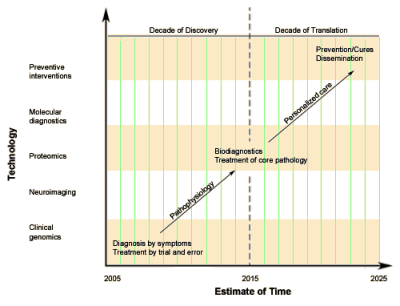Awakening into consciousness in the post-WWII era, I was unaware how fortunate I was. There was a large radio in the living room for endless entertainment. And some nights, it was announced we were going to the movies – and we went. Some families planned such things in advance, but we just went. Unless it was near the end when we got there, we went in and picked up the story where it was – watching until it came back around. Someone would whisper, "This is where we came in," and we’d go home.
In a commentary just published on innovation in health care, Narayan and colleagues describe the need for integrated solutions to mental health care. Moving beyond “magic bullets” and the magical thinking of a single intervention for a complex problem, they recommend a comprehensive model that includes early detection, better access to care, monitoring, and patient-reported outcomes. None of this would be particularly innovative, except that Narayan and his colleagues all work for a pharmaceutical company [Janssen]. They aren’t just suggesting new health care policy, they are recommending that pharmaceutical R&D redefine innovation around a holistic approach to patient needs rather than a singular focus on molecular targets.
What Narayan and colleagues are suggesting is that pharmaceutical companies can follow the IBM lead and the RAISE model to develop similar toolkits that bundle medical and psychosocial care. The jury is still out on whether this will work for mental health care as well as it has worked for information technology. But there is little question that we need better “solutions” for patients with serious mental illness. It’s time to think beyond magic bullets.
Beyond magic bullets: true innovation in health care.
by Narayan VA, Mohwinckel M, Pisano G, Yang M, and Manji HK
Nature Reviews. Drug Discovery. 2013 12:85-86.
The time has come to move beyond product-focused ‘magic bullet’ therapeutic development strategies towards models that can also incorporate devices, tools and services to provide integrated health-care solutions.
Janssen Neuroscientists and Colleagues Challenge Healthcare Industry to Create Integrated Approaches to Healthcare Innovation in Newly Published Article
Scientists and business leaders call for models of care that include therapeutics, devices, tools and services
JNJ.com
Feb. 5, 2013TITUSVILLE, N.J./PRNewswire/ — Janssen Research & Development, LLC, ["Janssen"] announced today the publication of a new article that addresses integrated approaches to healthcare solutions. The authors challenge the healthcare industry to expand its thinking beyond product-focused, "magic bullet" drug development and discuss the need for an integrated approach to patient care, including use of devices, tools and services to help a patient’s progress. The commentary, "Beyond magic bullets: true innovation in health care," was published in the February 2013 issue of Nature Reviews Drug Discovery…
Well, this particular "true innovation" is where I came in. I arrived in 1974 on the downhill leg of the community mental health movement. The love affair with neuroleptic "magic bullets" was waning [tardive dyskinesia had arrived and we talked a lot about drug holidays] but the eloquent rhetoric of packages of psychosocial this-and-that was still in high gear. The problem was that the money had run out and the resources didn’t match the sermons. By 1980, federal assistance disappeared and the States didn’t step up to the plate. I recall it as the birth of the homeless era for the chronically mentally ill [in discussions, I called the homeless mentally ill "Reagan’s people" to the consternation of my colleagues]. It was the beginning of "transinstitutionalization" when many of the "deinstitutionalized" mentally ill ended up in a different kind of institution [prison][under metropolitan bridges]. The out-of-work "hobos" of the depression era gave way to the "skid row alcoholics" that were then replaced joined by the "wandering mentally ill." Looks like Janssen is looking to repackage the Community Mental Health Movement with its "magic bullets" and create a new product. I guess if you live long enough, you get to see things come back around.
But the real reason I lingered on Dr. Insel’s blog post is his comment, "It’s time to think beyond magic bullets." This is quite a change from the Tom Insel circa 2005 who wanted to call psychiatry "clinical neuroscience" and laid out our timetable for the future:

While I’m glad to hear him finally changing his tune, I’m pretty discouraged by his looking towards the pharmaceutical industry for guidance. He’s still following their lead. The noun "Direct ·or" comes from the verb, "to direct"…
The materialist dialectic in psychiatry???
I’ve always said psychiatry has to find a “value-add” to justify its existence now that any prescriber can do the work of a psychiatrist in prescribing drugs. The powers-that-be have finally seen they need this value-add, too. This is it — “holistic” treatment. GPs can’t provide it because they don’t have the training and time.
Psychiatry is going to try to save itself by adding back in the human dimension. Pretty weird, huh?
““We want to elevate mental health to standard physical health,” said Dr. Charles R. Marmar, chairman of the psychiatry department at NYU Langone Medical Center, and the lead investigator on the project.”
““We’re at the beginning, it’s true,” he said. “We should be like cardiologists, able to test biologically for mental health problems.”
http://www.nytimes.com/2013/02/07/us/study-seeks-biomarkers-for-ptsd-and-traumatic-brain-injuries.html